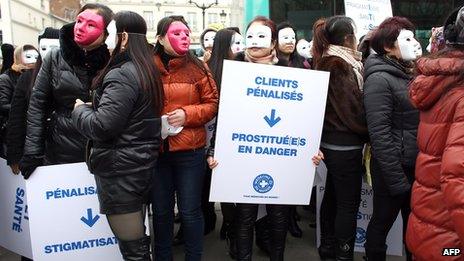Will France make paying for sex a crime?
- Published

These prostitutes in Paris say it is wrong to criminalise their clients
Can a country eradicate prostitution by punishing not the people who sell their bodies for sex, but the people who buy them?
That is the ambitious premise behind new legislation to be debated soon in the French National Assembly.
The bill tabled by the ruling Socialist Party (PS) contains more than 20 articles. Most of them are aimed at disrupting foreign pimping networks, or helping sex workers who want to stop.
Another abolishes an existing law against touting.
But the bit which has got France talking is Article 16.
For the first time in France, this would make it an offence for a person to "have recourse to prostitution", in other words to pay for sex.
Those found guilty would be liable for fines of 1,500 euros (£1,250; $2006) - double that if it was a repeat offence.
In addition, the man who paid for sex would be made to undergo an "awareness" course on prostitution, similar to ones on the dangers of drink-driving given to traffic offenders.
The bill has a good chance of passing into law.
Provocative manifesto
A similar resolution was voted through the assembly at the end of 2011, with the support of both left and right. It only failed to proceed because of lack of parliamentary time.
But shifting the criminal burden away from prostitutes, and onto those who use them, is a major ethical and social change. And ahead of the parliamentary debate - scheduled for 27 November - the national debate is starting to catch fire.
The most eye-catching opposition has come from an unexpected quarter.
Last week a group of men signed a petition entitled "Touche pas a ma Pute!" (Hands off my Tart!), which was published in the magazine Causeur (Chatterer).
Styling themselves the "343 Salauds" (Dirty Swine), the men - led by writer Frederic Beigbeder - condemned MPs for intruding into the private sphere and trying to "decree norms for desire and pleasure".
"We believe that everyone has the right to freely sell their charms - and even to enjoy it," they said.
"We love freedom, literature and intimacy. When the state starts taking charge of our private parts, all three are in danger .… In opposition to the sexually correct, we intend to live as adults."
The petition was deliberately provocative, and it hit the mark. The reaction was outraged and instantaneous.
Some were particularly offended over the signatories drawing a parallel with two of the great causes of the progressive left: abortion and anti-racism.
The "343 Salauds" was a reference to the 343 Salopes (Dirty Cows) - campaigning women who back in 1971 signed a manifesto declaring that they had had an abortion.
And "Touche pas a ma Pute!" is a rip-off of the 1980s slogan "Touche pas a mon Pote!" (Hands off my Buddy!), which helped mobilise opinion against the far-right Front National.
According to the Socialist Party, the Salauds' petition was "scandalous and reactionary … lifting the lid on the real aim of those who defend prostitution - which is the preservation of … male domination and female submission."
For the organisation Osez le Feminisme (Dare to be Feminist), Anne-Cecile Mailfert said it was the work of "343 dominant males who want to protect their position and continue to use money for access to women's bodies".
The 343 men stated that paid sex should only be with freely consenting partners, and it condemned "violence, exploitation and human trafficking". But for opponents this was at best naive, at worst self-serving.
"How can you claim the right to liberty in an activity which exemplifies its very opposite?" said Anne Zelensky, one of the original 343 Salopes. "When it comes to prostitution, no-one is free: not the prostitute and not the client."

The vast majority of prostitutes in Paris are believed to be foreigners
Dispute about freedom
The row has thrown into relief one of the intellectual faultlines in modern-day France, where there is a rumbling "fronde" or insurrection against the "politically correct".
Opponents see the signatories as right-wing reactionaries, malevolently usurping the cry of Liberty in order to defend their macho privileges.
But for the Salauds, the fight is against a nannyish and intolerant ruling class that has turned the feminist slogans of 40 years ago into a moralistic crusade.
"Today the left - which is supposed to be the cutting edge of progressivism - is dominated by an irrepressible urge to control and prohibit," wrote Causeur's editor Elisabeth Levy.
In truth debate on the prostitution law will hinge on other factors.
Opposition to the bill also comes from many people who work with prostitutes. They say that criminalising clients will drive the business further underground, and make prostitutes even more vulnerable to exploitation from the mainly foreign gangs that control them.
It is estimated that there are around 20,000 prostitutes in France, and 90% of them are of foreign origin.
Others argue that the law may well cut "on-the-street" trade, but will be ineffectual against internet-based prostitution which is poised to sweep up the demand.
Many "independent" prostitutes also oppose the law, saying it will threaten relationships they have built up with their clients.
Meanwhile both sides in the debate cite findings from the few other countries, like Sweden, that have already criminalised paying for sex.
But in a way the big question is the one asked by Causeur and the 343 Salauds.
Is eradicating prostitution - the self-declared goal of the government - really a serious proposition?
Or put another way, which is stronger: the human sex drive, or the law?
- Published17 October 2013
- Published26 August 2013
- Published30 September 2010
- Published7 December 2011